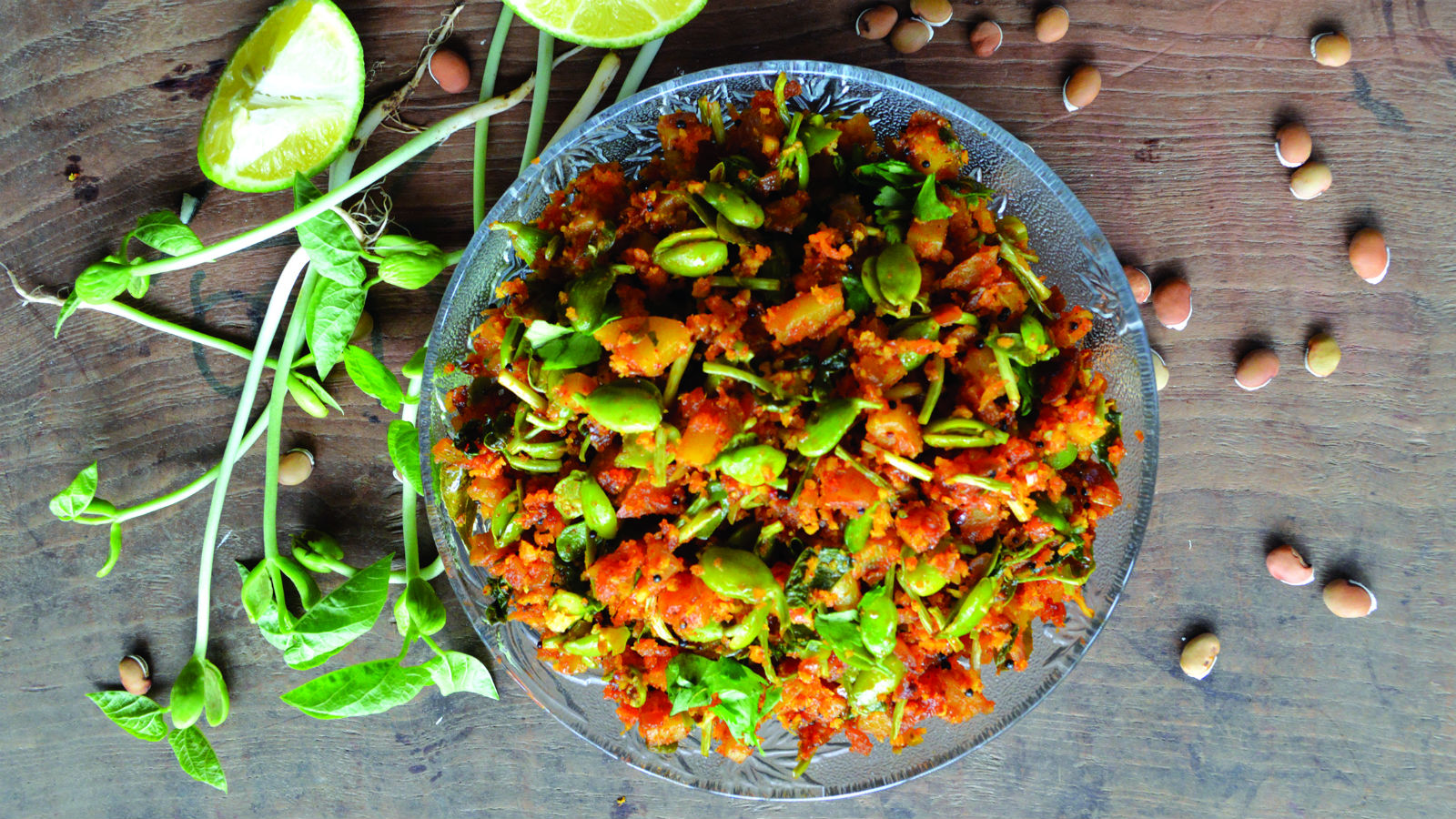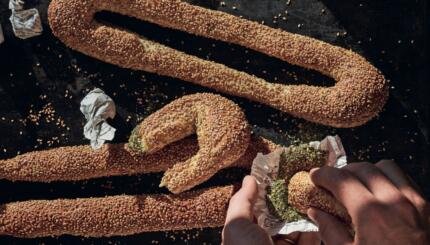The Bene Israeli people have lived and thrived in India for hundreds of years. They represent a small Jewish community and are now indigenous to India. This community is largely settled along the western coast of India, scattered in and around Mumbai. They are believed to be descendants of Jews fleeing Jerusalem after the destruction of the Temples, who were then shipwrecked along this coast of India. Over time they have adopted many local customs, including, of course, food.
Over these past centuries, the Bene Israeli Jews have taken on a culinary tradition nearly unknown outside the community called Byrd-ya-che Saan/Byrd-ya-cha Roja, which commemorates the solemn Jewish holiday of Tisha B’Av. Known only in old books, this phrase referencing the mournful Jewish holiday is in the local language, Marathi, wherein “Byrd” represents a specific sprouted field peas dish, “Saan” means celebration or observance, and “Roja” means fasting.
Tisha B’Av typically falls in late July or early August, commemorating two separate destructions of Temples in Jerusalem, and it also coincides with the height of Indian monsoon season. For the Indian Jews, it often happens during the Hindu month of Shravan that much of the country observes. Much like the observances around Tisha B’Av, during the month of Shravan, devout Hindus abstain from consuming meat and alcohol and observe religious fasting. One lentil dish, Byrd’a, is popular in this western region of India, but particularly favored when following a meatless diet. The curious similarities between two traditions from different religions appears to manifest in an adaptation of the observances for Tisha B’Av, where instead of serving boiled eggs at the “mourning meal,” the Bene Israeli community prepare Byrd-a.
The preparation of Byrd-a reflects the introspective phase of mourning and lamentation, laden with meaning and symbolism. Production of the dish starts nearly a week prior to Tisha B’Av. Field peas are first soaked overnight, as on their own they are quite bitter. Soaking softens the outer casing of the beans and begins to remove their bitterness. These beans are then allowed to sprout. Following this, they are processed in one of two ways: either the skin is removed and the halves separated and used directly in the stew, or the sprouted seed is planted in the soil and harvested as seedlings. During the sprouting, the bitterness of the beans turns sweet and nutritious, much like rituals around observing the traditions. Seedlings are allowed to grow in the shade for a few days and harvested on the day of Tisha B’Av. Its consumption marks the end of the fasting period, suggesting that once past grief, the household can prepare for a revival of spirit and belief.
The Nosher celebrates the traditions and recipes that have brought Jews together for centuries. Donate today to keep The Nosher's stories and recipes accessible to all.
Some notes about the recipe below:
- Sprouted mung beans (not the seedlings) can be used in place of bitter field peas for convenience.
- You need to wash and soak the bitter field peas overnight in water. Drain the water and place them in a colander lined with a damp cheese cloth. Allow the beans to sprout throughout the day. When the beans have begun to sprout one of two methods can be used:
- Carefully remove their slippery covering and separate the two halves of the beans. Discard the casing of the beans, rinse the halves, and use in the stew.
- Plant the sprouts in soil in a prepared pot, lightly cover with an old newspaper, and water the soil. Remove the covering the next day and let the seedlings grow. Water them every day until the sprouts grow to about 3-4” tall and begin to form leaves.
Ingredients
- 2 Tbsp oil
- 1 cup diced yellow or white onions
- 1 tsp ginger paste
- 1 tsp garlic paste
- 1 jalapeño pepper, finely chopped (optional)
- 2 whole green cardamom pods
- 1” piece cinnamon stick
- 1 bay leaf
- ¼ tsp turmeric powder
- 1½ tsp cayenne pepper powder
- ¾ tsp cumin powder
- ¾ tsp coriander powder
- 1 medium red potato, peeled and finely diced
- ¼ cup grated mature coconut flesh (see pre-prep note)
- 1 cup bitter field peas (see pre-prep note)
- ¼ cup water or more as desired
- 1 tsp salt
- juice of 1 lime
- ½ tsp sugar
- ½ cup fresh cilantro leaves
Directions
- If using sprouted seedlings, harvest the sprouts, trim the roots, rinse, trim, and set aside. If using the sprouted beans, rinse them before use.
- Heat the oil in a large saucepan. As it heats up, add the onions and sauté until lightly golden brown. Then add the ginger and garlic paste and jalapeños if using any, and sauté until fragrant. Add the whole green cardamom pods, cinnamon stick, and bay leaf, and sauté for 1 minute.
- Carefully add the turmeric, cayenne pepper powder, cumin powder, and coriander powder, give it a quick stir, and add the fresh grated coconut, sautéing for 1-2 minutes until it loses some of its liquid.
- Next add the diced potatoes and trimmed sprouted field beans, and gently mix until they are evenly covered in spices. Cover the pot lightly, allowing the steam to escape and let this cook for about 8-10 minutes. Stir every few minutes to ensure even cooking and add water to ensure the beans do not stick to the pot and create a sauce as needed.
- As the beans continue to cook, season with salt. Add the lime juice and sugar, cover, and cook for another 3-5 minutes until the flavors have combined.
- Garnish with cilantro leaves. Serve hot with a pot of freshly made rice, rice bhakri, or another unleavened bread.
This recipe is excerpted with permission from “Ten Thousand Tongues: The Companion Cookbook” © Nandita Godbole, 2018.



